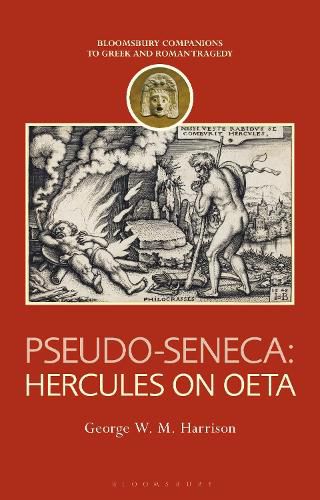Readings Newsletter
Become a Readings Member to make your shopping experience even easier.
Sign in or sign up for free!
You’re not far away from qualifying for FREE standard shipping within Australia
You’ve qualified for FREE standard shipping within Australia
The cart is loading…






A Roman tragedy widely considered to be post-Senecan and of unknown authorship, Hercules on Oeta is the longest play to survive from antiquity. This accessible volume offers a concise yet thorough introduction for readers coming to the play for the first time, exploring issues of authorship, date and performance alongside chapters on its literary antecedents, historical context, main characters and key themes, and reception in antiquity and beyond. Hercules on Oeta demonstrates that Hercules' death and deification was at least as important in art and myth as his twelve labours. The first half of the play is devoted to probing the humiliation he inflicted on his wife by returning with a pregnant, unwilling mistress, whose family he destroyed. Infected with a flesh-eating virus, the torment of Hercules became so great that he built a pyre for self-immolation: he appears again to his mother at the play's end, now deified.
As a study of the frictions between loyalty, fidelity and personal responsibility, the play raises the central question of whether one should be forgiven bad deeds by virtue of having also performed good deeds. There is more than one Hercules, and all his aspects are represented in this play: glutton, sexual opportunist, quick to violence and lacking in compassion, he was endearing but deeply flawed, tottering between pathos and parody, and very much a figure of our own time.
$9.00 standard shipping within Australia
FREE standard shipping within Australia for orders over $100.00
Express & International shipping calculated at checkout
A Roman tragedy widely considered to be post-Senecan and of unknown authorship, Hercules on Oeta is the longest play to survive from antiquity. This accessible volume offers a concise yet thorough introduction for readers coming to the play for the first time, exploring issues of authorship, date and performance alongside chapters on its literary antecedents, historical context, main characters and key themes, and reception in antiquity and beyond. Hercules on Oeta demonstrates that Hercules' death and deification was at least as important in art and myth as his twelve labours. The first half of the play is devoted to probing the humiliation he inflicted on his wife by returning with a pregnant, unwilling mistress, whose family he destroyed. Infected with a flesh-eating virus, the torment of Hercules became so great that he built a pyre for self-immolation: he appears again to his mother at the play's end, now deified.
As a study of the frictions between loyalty, fidelity and personal responsibility, the play raises the central question of whether one should be forgiven bad deeds by virtue of having also performed good deeds. There is more than one Hercules, and all his aspects are represented in this play: glutton, sexual opportunist, quick to violence and lacking in compassion, he was endearing but deeply flawed, tottering between pathos and parody, and very much a figure of our own time.